The Finest Sword & Sorcery: Announcing the Winners of the Stalking the Beast Contest
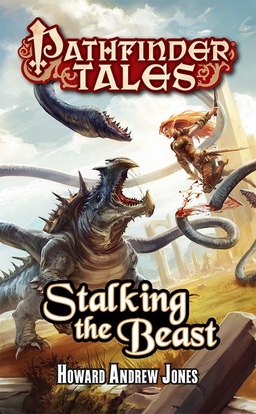 Last month we invited Black Gate readers to tell us about the best sword & sorcery tale they’d ever read, in one paragraph or less.
Last month we invited Black Gate readers to tell us about the best sword & sorcery tale they’d ever read, in one paragraph or less.
In return, we offered to award a copy of Howard Andrew Jones’ terrific new Pathfinder Tales book, Stalking the Beast, the follow-up to his hit Pathfinder release Plague of Shadows from Paizo Publishing, to five lucky winners.
Those five winners were randomly drawn from the list of all qualified entrants.
Before we announce the winners, let’s have a look at some of the story suggestions. As much as we’d like to, we can’t reprint all the entries we received, so we’ll limit it to the 10 we found most insightful, well written, or intriguing. In the interest of diversity, we’ll limit our sampling to one entry for each author or major work. (But fret not — all qualifying entries received before December 1st were included in the drawing.)
We’ll start with David Kahler, who kicks things off in excellent fashion with the tales of Fritz Leiber:
My favorite Sword and Sorcery book is Fritz Leiber’s Swords Against Wizardry, a Fafhrd and Grey Mouser tale. From the very beginning, when the pair consult an old hag ( because, according to Fafhrd, before embarking on any great enterprise, it’s customary to consult a warlock or witch”) to the Lords of Quarmall and the battles with Hasjarl’s wizards, Swords Against Wizardry is (IMHO) one of the best of Leiber’s tales. His prose is superb, and the action sequences just as good. Fafhrd and Grey Mouser epitomize the “Neutral-Good” actions of adventurers who (even while they seek to enrich themselves) strive to do the right thing even if the “wrong” course of action would have been easier and more convenient. Thanks for the opportunity to win HAJ’s latest book! I always enjoy finding new reads and authors on your site. Keep up the good work!
You’re most welcome, David. Thanks for the enthusiastic entry — and good luck!
[Click on any image in this article for a larger version.]
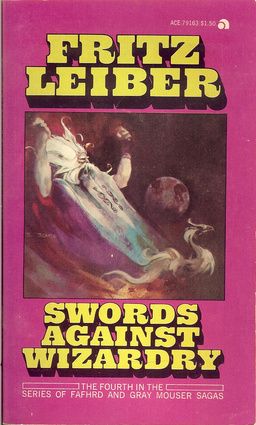 Next up is Jeffrey Douglas Hotchkiss, who recommends something much more recent with the novels of Paul S. Kemp:
Next up is Jeffrey Douglas Hotchkiss, who recommends something much more recent with the novels of Paul S. Kemp:
The Hammer and the Blade hooked me right from the start. This was the first novel I’ve read in a while that was hard to put down each night. I normally read outside while enjoying a nice cigar, some tunes, and a Coke Zero. And I was going outside earlier than usual so my light didn’t run out before I could get 60 or 80 pages in before dark. The multi-dimensional relationship between Egil and Nix was the key to this story, though. You just knew who these characters were. They take s**t from no one (unless they’re forced to dine on spellworms), they’re flawed, and they’re funny as hell. The minor characters were not just those little purple cabbage bits in the salad, they were as written as if they were as important as the shredded cheese or bacon bits. Even the “slow” parts (though it’s really not fair to call them slow, because in the lulls between the physical action scenes were scenes full of emotional and dialogue action) held my attention. At several points in the story I thought I knew where it was going because I’d read it a thousand times, but each time I read on and was happy that I was wrong.
That’s the best salad-based metaphor for character development we’ve ever seen. “The minor characters were not just those little purple cabbage bits in the salad, they were as written as if they were as important as the shredded cheese or bacon bits.”
If the trademark office would let us, we’d get a trademark on that sentence right now. That’s how much we love it.
Jeffrey, you’re some kind of genius. We hope you win two copies of Stalking the Beast.
Daniel J. Davis tells us about the early novels of Matthew Stover:
I knew I was in for a different kind of fantasy novel when the hero made an Elmer Fudd reference. The fact that said reference took place in the middle of a kick-ass fight sequence, during a harrowing escape scene, and immediately following the assassination of an Emperor? Well, that only made it more awesome. And I was only five pages into the book. Welcome to Heroes Die, Matthew Stover’s first volume in what would eventually become the Acts of Caine series. Heroes Die was a violent counterpoint to the plodding doorstopper fantasies that dominated the shelves at the time. It was also a modern take on the adrenalin-charged, action-packed sword and sorcery tales of the classic pulp era. References to Jack Vance, Robert Heinlein, and countless others fill its pages. It’s the story of Hari Michaelson, a wealthy actor from a dystopian future Earth. But acting isn’t the same profession it once was. Actors from Hari’s time are trained in esoteric arts and sent to Overworld, a lush alternate plane of adventure, monsters, and magick. Their job: risk their lives in exciting and interesting ways for the masses back home. For a one-time ghetto punk like Hari, it’s a path to wealth and glory. But the consequences of Hari’s callous adventures on Overworld are very real to the citizens who live there. After triggering the bloodiest war in the history of two worlds, Hari is burnt out. It’s only when his estranged wife disappears that Hari feels that fire again. The fire that means he’s going back to Overworld as Caine, the legendary Blade of Tyshalle.
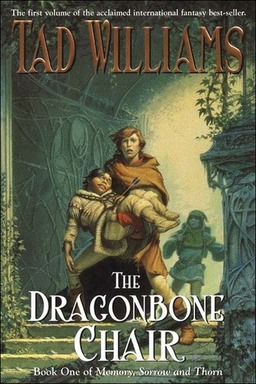 Nicholas Schoonbeck shares his love for the heroic fantasy of Tad Williams:
Nicholas Schoonbeck shares his love for the heroic fantasy of Tad Williams:
My favorite author is Tad Williams, for his fantasies, his novels about the internet before there was an internet, and even his newest stuff about Angels, Heaven & Hell. The first book I read of his was Tailchaser’s Song, a fantasy about cats. But the book that really made me a fan was The Dragonbone Chair, the first book of Sorrow, Memory & Thorn. It was amazing because the first 180 pages were establishing the main character, before the adventure even started. And once it did, it really never stopped being amazing. Williams was the first author since Tolkien that I had read who created different societies, like Elves & Dwarves, but different and unique. The best part was that each spoke their own language, and he included pronunciation guides in the back of the book. All his work is amazing, but that’s the book that made me a life long fan.
Next up is Anthony Borzotta, who stretches the definition of S&S a little with his entry:
My favorite fantasy novel has got to be Soul Music, by Terry Pratchett. While not strictly Sword and Sorcery in a traditional sense, it DOES feature lots of sex, drugs, and rock and roll. Well, one out of three ain’t bad. Soul Music features some of my favorite moments in any book, ever; wizards being rebellious, Death’s granddaughter on her pale horse stopping off for curry, Death joining the foreign legion, and the playing of the null cord. It’s got jokes, puns, a sweeping plot, great characters, magic, and Death riding a motorcycle! It’s legit. If you’ve never read it, I highly recommend picking it up.
Yeah, that’s more or less on the outer limits of sword & sorcery, Anthony. But since we’re Terry Pratchett fans, we’ll indulge you.
Steven Sior celebrates the early work of prolific independent author David Dalglish:
While perhaps not my favorite sword and sorcery book, over the past couple of years the one that really stuck out in my mind is Night of Wolves by David Dalglish. Book one of The Paladins series, it was to my mind the best of the series. It establishes characters and events in a world in a way that’s not so full of exposition that it’s unreadable. The dichotomy of two paladins of opposing gods works well with their story as they grow to understand and even like each other, overcoming their differences to fight together. For a lot of roleplaying games, from D&D to Pathfinder and even games such as Call of Cthulhu, it’s easy to relate to when people of seemingly conflicting backgrounds and ethics must work together for the greater cause. Plus, the paladin, Jerico, is a great guy who draws you in. It makes me want to enter a fantasy RPG game with a similar build. Granted, the series seemed to taper off near the end, but at least it made me want to read other series to follow the characters.
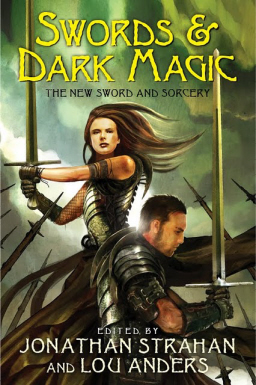 Guillermo Cantu was the first to opt for a short story, which endeared him to us immediately:
Guillermo Cantu was the first to opt for a short story, which endeared him to us immediately:
“Goats of Glory” by Steven Erikson, from the Swords & Dark Magic anthology. The first and in my opinion best story of the anthology, it tells the tale of a small group of ragged mercenaries that are tricked into spending a night in an abandoned castle and end up having to fight a horde of demons. The basic tale is simple, but the characterization of each of the mercenaries is great, the story is fun, and once the action begins it never lets up. The ending is the best part of the story, and hints at another tale that I’d really love to read, so it leaves us wanting for more, which is a sign of a great story.
While we’re on the topic, Swords & Dark Magic gets our highest recommendation (and not just because the editors saluted us in their introduction by saying “Black Gate magazine… has been the definitive source for sword and sorcery short-form works since its launch in 2000.”) Check out our report here.
Kid Greg was the first (but by no means the last!) to nominate Robert E. Howard in our contest.
“Beyond the Black River” by Robert E Howard. Conan, hand’s-down, is the undisputed greatest sword & sorcery character, and my favorite Conan story is “Beyond the Black River.” It’s an awesome frontier story that is also the only Conan tale written in a 1st person narrative by a follow soldier of Conan. The narrator is a Gunderman which would be the equivalent of a pioneer, so by no means is a “city bred civilized weakling” but in comparison to the Cimmerian scout, he’s a cultured and educated gentleman. But even more savage than Conan are the primordial Picts. The extreme contrasts make for great elements of the story. It’s probably the most unique Conan story that Howard wrote.
Perhaps not surprisingly, Robert E. Howard had far and away the most number of votes.
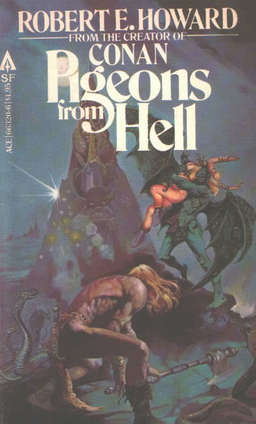 So we’re going to bend the rules a bit, and reprint two Howard entries, since we can’t resist bringing you Stan Wagenaar’s enthusiastic endorsement for “People of the Dark.”
So we’re going to bend the rules a bit, and reprint two Howard entries, since we can’t resist bringing you Stan Wagenaar’s enthusiastic endorsement for “People of the Dark.”
Favorite S&S story? Wow, that is tough. There are so many, and so many that are good. But one stands out for me; “People of the Dark” by Robert E Howard. This tale grabbed me like no other, for several reasons. First, the character Conan the Reaver seems to be a prototype for the later Conan the Cimmerian we all know and love. Secondly, it is set in Dark Ages Britain, a favorite historical period for me. And most importantly of all, the tale is so dark, gloomy and doom-filled. There seems to be no hope, no chance, other than to sell one’s life as violently as possible as the end draws near. And does Conan the Reaver exact a steep price! The scenes of combat between Conan and company against the horrible ‘People’ of the title are some of the most graphic and bloody words Howard had ever put to paper. The mix of adventure, swordplay and horror is a near perfect example of ‘Sword and Sorcery’ in the classical Weird Tales sense, and is a personal favorite of mine. I first read “People of the Dark” in a copy of Pigeons from Hell, a Howard anthology published by Ace back in ’78 or ’79. Still have that copy on my shelf, plus the comic adaption in Savage Sword of Conan, and an audio version found in The Horror Stories of Robert E Howard, from Tantor Media. Yeah, I like this story a lot!
Gus Bumgartner shares his affection for one of the best new writers of S&S to emerge in the last decade, C.L. Werner:
My favorite Sword and Sorcery short story is “The Rotten Bones Rattle” by C.L. Werner. This story was published in Rage of the Behemoth by Rogue Blades Entertainment. This story has it all: Samurai Ninja, Wizard, and a giant skeleton. C.L. Werner said when he thought up his main character, Shintaro Oba, that he was trying to create a Conan-like character only with an Asian background. There are countless authors that have made this “Conan” claim, and they all fall short, but I think Mr. Werner really has something here. He is able to capture that neutral attitude of Conan. Both characters are driven by honor more than any sense of good or evil. The descriptions of the Giant skeleton and the wizard are really what make this story for me. How awesome is it at towards the end of the story when the wizard gouges out his own eyes to give the gashadokuro sight to kill the ninja? As far as I know there are only two Shintaro Oba stories, but I hope that there will be many more.
Hear hear! And if we could give you bonus points for name-dropping Jason M. Waltz’s excellent anthology Rage of the Behemoth, one of the finest S&S anthologies of the 21st Century, we would. (Come to think of it, what’s stopping us? Nuthin’. Here you go, Gus: bonus points. Use them wisely.)
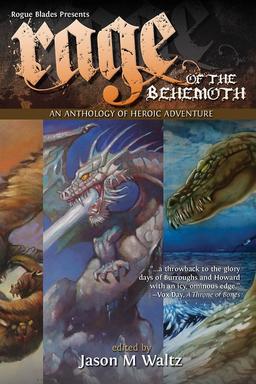 And we give the closing words to Gus Gyde, because he understands that no modern S&S list is complete without the works of Glen Cook. And because he had a tree house.
And we give the closing words to Gus Gyde, because he understands that no modern S&S list is complete without the works of Glen Cook. And because he had a tree house.
My favorite sword and sorcery novels are Glen Cook’s Black Company series. I remember reading them in high school (1986ish) in the evenings or when I needed to take a hard earned break from programming video games on my Commodore VIC-20 (those 3 KB of ROM aren’t going to fill themselves). My well-worn book club hardcover edition survived many trips in the car with my parents and evenings in the tree house. Seriously, I am not going for Norman Rockwell imagery here, I really had a tree house in an ancient walnut tree. Those trees really make a mess when they drop their crop every year, and I hate walnuts too. Anyhoo, you can see what an active social life I had. If I could relate to a character in a gritty fantasy novel, it would be the archivist of a mercenary group. I could still be a nerd but get to hang out with the danger boys, run with them on all of their dangerous adventures to exciting places, and even dive into battle from time to time. I would totally be the nerd who wanted to write everything down and share the adventures with future members someday because, hey, the old ones keep getting killed. Those images have stuck with me more than any other of the hundreds of books I read during that time. I have new copies of the series (the book club edition got traded in to a used bookstore in Yakima, Washington), but I hesitate to read them because I don’t want to spoil the rich images that I still carry with me from high school by mixing in my boring adult perspective. Whether or not I choose to dive in again and add the new ones that have appeared since then, I will always treasure my experiences with the Black Company.
“The old ones keep getting killed.” Truer words were never spoken. We’re big fans of The Black Company novels here but, man, they had a high body count.
Thanks for the belly laugh, Gus. You’re all right.
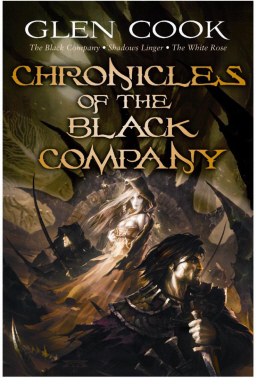 That brings us to the end of our 10 selections (well, 11 if you count Robert E. Howard twice) of the best entries in our “Finest Sword & Sorcery” contest. As always, we hope you’ve learned something. I sure have — including the fact that I should not have given up around page 100 of The Dragonbone Chair, and I should definitely make time to re-read Rage of the Behemoth.
That brings us to the end of our 10 selections (well, 11 if you count Robert E. Howard twice) of the best entries in our “Finest Sword & Sorcery” contest. As always, we hope you’ve learned something. I sure have — including the fact that I should not have given up around page 100 of The Dragonbone Chair, and I should definitely make time to re-read Rage of the Behemoth.
But it’s time to announce the winners. All valid entries in our contest were listed in a spreadsheet, and then we generated five numbers using the only scientifically-proven method of true random number generation: D&D dice.
We are pleased to announce that the winners of a copy of Stalking the Beast, compliments of Paizo Press, are:
Guillermo Cantu
David Kahler
Stan Wagenaar
Jeffrey Douglas Hotchkiss
Nicholas Schoonbeck
Congratulations to the winners!
We will be contacting all five winners separately to arrange prize delivery. We’d like to thank Howard Andrew Jones and Paizo Publishing for providing the complimentary copies.
Stalking the Beast was written by Howard Andrew Jones and published by Paizo Publishing. It is 400 pages, priced at $8.99 in paperback. It is the follow-up to his hit Pathfinder release Plague of Shadows. Read more details in our New Treasures article.
Read a sample chapter from the book, and Howard’s new story “Bells For the Dead,” featuring the gunslinging bounty hunter Lisette from Stalking the Beast, at Paizo.com.
So I didn’t win a book…but…I got the coveted closing spot (aka “headliner”), and I am officially “all right” according to John. Not a bad day, all in all.
Nice list! I was starting to wonder if I’d misread the contest challenge though, until we actually got to the short stories…and then lo and behold, RAGE OF THE BEHEMOTH got a shout out! 🙂 Very cool.
Glad to learn more of some titles I’ve been eyeballing, HEROES DIE and THE HAMMER AND THE BLADE. Kudos to Guillermo Cantu for naming a Steven Erikson tale as his favorite. Oh, and for winning too.
Gus Bumgartner is, of course, a winner in my book! Anyone who recognizes the greatness of C.L. Werner AND a RBE title deserves recognition! For that matter, Gus if you’d like it, you’ve won an eBook version of RotB…just as soon as I finish creating it. (I have conversion formatting to do, a lot of it, but when I’m done I’ll send you a copy in format of preference. Please email me at roguebladesentertainment@gmail.com.)
Thanks a lot Jason. I appreciate it. I’m just happy to see RBE up and running again. So you can get to publishing more of Werner’s stories.
Thanks for the contest!
It’s nice to have your entry featured, and of course to win a copy of Stalking the Beast 🙂